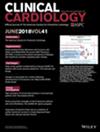The Prognostic Value of Platelet-Albumin-Bilirubin Score in Patients Undergoing Transcatheter Aortic Valve Replacement
Abstract
Background
Transcatheter aortic valve replacement (TAVR) has emerged as a well-established treatment option for patients with aortic valve stenosis and/or regurgitation. However, risk stratification in patients indicated for TAVR remains challenging. This study aimed to evaluate the predictive value of the platelet-albumin-bilirubin (PALBI) score on post-TAVR mortality.
Methods
A total number of 812 patients with aortic stenosis and/or aortic regurgitation who underwent TAVR were consecutively enrolled in this study. PALBI score was calculated based on preoperative baseline bilirubin levels, albumin levels, and platelet counts. Patients were categorized into two groups according to the median PALBI score.
Results
The median age of the study population at baseline was 74 (IQR: 69.00–80.00) years, and 58.6% were male. During the whole follow-up period, all-cause death was observed in 60 (7.4%) patients and 30 (3.7%) patients died due to cardiovascular events. According to multivariate analysis, a high PALBI score was independently associated with all-cause mortality (HR = 2.679, 95% CI: 1.456–4.930, p = 0.002) and cardiovascular mortality (HR = 2.785, 95% CI: 1.133–6.849, p = 0.026). ROC curve analysis showed a significant predictive value of the PALBI score for all-cause mortality (AUC = 0.633, 95% CI: 0.563–0.704, p = 0.001). Furthermore, the PALBI score strengthens the predictive value of the Society of Thoracic Surgeons (STS) score for all-cause death after TAVR (STS score vs. PALBI score + STS score: AUC: 0.742 vs. 0.768).
Conclusion
A high PALBI score was associated with increased all-cause and cardiovascular mortality in patients after TAVR. PALBI score can further enhance the predictive potential of STS score for all-cause mortality.


 求助内容:
求助内容: 应助结果提醒方式:
应助结果提醒方式:


